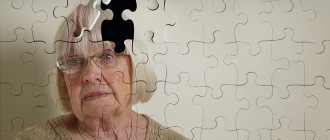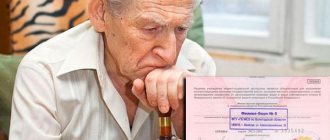Mental disorders in older people are accompanied by severe behavioral and mental disorders, complete loss of working capacity, and self-care skills. However, even the most modern treatment methods can only slow down the progression of the disease. The specialists of the Leto clinic offer not only supportive therapy for senile dementia , but also the possibility of round-the-clock medical supervision in a comfortable hospital equipped with everything necessary.
Causes of the disease
The etiology of senile dementia is associated with various pathological processes in the body. This:
- complications of traumatic brain injury;
- previous strokes;
- deterioration of cerebral circulation;
- neurological pathologies (neoplastic brain tumors, central nervous system infections);
- hypothyroidism, severe deficiency of cyanocobalamin, folic acid;
- deterioration of liver, kidney, and respiratory tract functions;
- intoxication due to alcohol abuse, drug use, adverse reactions of some potent drugs;
- aging-related changes in hormonal levels and metabolism;
- hereditary predisposition, etc.
What is senile dementia in older people
In the development of senile dementia of the brain, the following stages are distinguished:
- preclinical, characterized by mild forgetfulness, slight difficulty and slowing of basic mental reactions;
- mild dementia, in which mental changes become obvious and noticeable to others, although working capacity is partially preserved;
- moderately severe senile dementia: symptoms of the disease progress, memory rapidly deteriorates, orientation in time and space is impaired;
- severe dementia with complete loss of self-awareness, everyday self-care skills and severe mental disorders.
In modern psychiatry, there are several options for classifying the disease (primary, secondary, mixed, etc.). But it is generally accepted to divide senile dementia into several syndromes:
- Alzheimer's type;
- Pick's disease;
- Creutzfeldt-Jakob disease;
- dementia with Lewy bodies;
- Huntington's disease;
- dementia due to parkinsonism.
By and large, the main symptoms of various forms of the disease, prognosis and treatment principles differ slightly. The pathogenetic mechanisms of development differ (in particular, the area of brain damage), the age at which the first signs of pathology appear (for example, Pick syndrome manifests itself at 45–50 years), and the etiology (in Huntington’s, a genetic predisposition is clearly visible).
Course of the disease
The clinical picture is characterized by gradual development. The duration of the stage of development of dementia and the prognosis of life expectancy depend on concomitant diseases, the quality of care and treatment.
Important! It is necessary to distinguish the first signs of the disease from forgetfulness, which is often observed in old age.
The stage of dementia can be determined using diagnostic methods that show the degree of pathological changes and compliance with clinical symptoms. The stages of dementia in older people develop sequentially, and mental changes are irreversible. Dementia that begins after 70 years of age is more benign.
Clinical picture of senile dementia
It occurs in old age and is characterized by progressive mental disorders and the gradual development of total disability. On average, 4.5–5% of people over 65 years of age suffer from the disease ; women are diagnosed twice as often.
A specific symptom is the so-called “senile psychopathization.” What does it mean? Signs of rigidity and coarsening of the personality, narrowing of interests and horizons in general come to the fore in the patient’s behavior and actions. Responsiveness, the ability for emotional empathy, and sympathy are lost. Typical:
- gullibility and suggestibility, the patient quickly succumbs to the influence of others, and we are talking about complete strangers, which is often used for fraudulent purposes;
- wariness, mistrust and suspicion towards relatives and friends;
- absent-mindedness, inattention, forgetfulness;
- changes in behavior: the patient may constantly walk around his home, checking door and window locks, listen to extraneous sounds, not sleep, fearing burglars;
- sleep disorders: insomnia at night and irresistible drowsiness during the day (a person sometimes falls asleep while eating, while talking, etc.);
- disinhibition, sexual promiscuity (in severe cases, attempts at sexual violence are not excluded);
- frequent falls, fainting, tremors, shuffling gait (typical of Lewy syndrome);
- speech disorders (the occurrence of stereotypies, when the patient repeats the same thing several times with the same intonation, reluctance to speak, etc.);
- impaired coordination of movements, etc.
One of the main symptoms of senile dementia is memory impairment. At the initial stage of the disease, the ability to remember is partially preserved, but over time, it becomes more and more difficult to consolidate new information. Fixation amnesia gradually develops (the patient does not remember recent events), then the patient ceases to navigate in time, in the surrounding space, and at the final stage of the disease, in his own personality. Memory loss occurs in the reverse order, and sooner or later a moment comes when a person, in principle, does not remember anything about himself.
False recognitions are common. A kind of “shift into the past” is possible: a person considers his children to be brothers/sisters or parents, says that he is in school, etc. This is due to the fact that relatively recently acquired events are forgotten, and earlier episodes from life come to the fore.
Sometimes senile delirium develops, but unlike senile and other forms of psychosis, in this case the awareness of what is happening is impaired not due to hallucinations, but due to a general distortion of the perception of reality.
At the terminal stage of senile dementia, the patient is completely immobilized, mainly lies in the fetal position and leads an almost vegetative lifestyle. But there are no neurological disorders (in particular, various automatisms).
Signs of dementia before death
At the last stage, the patient no longer shows vital activity. He is indifferent to the events of the world around him. This condition indicates impending death. Dementia before death combines the symptoms listed below.
Long sleep
It is almost impossible to wake up a person in such a state - a long-term suspended animation develops. Sleepiness takes up most of the day and night.
Lack of appetite
The patient loses his appetite due to the decline of vital functions. If he regains consciousness, he refuses to eat.
Hallucinations and delusions
Changes in the perception of the outside world in the form of hallucinations and delusions are a classic manifestation of dementia in the terminal stage. The person is completely disoriented, does not understand where, what and why is happening.
Changing body temperature
The decline in the functioning of the body is also reflected in body temperature. As a rule, it is underestimated. Poor blood circulation results in cold extremities.
Changes in heart rate and constriction of pupils
Interruptions in the functioning of the heart are possible, which is expressed in arrhythmia: bradycardia or tachycardia. In addition, there is a constriction of the pupils.
Features of the excretory system
There is a lack of stool, difficult excretion of dark-colored urine with a specific odor due to impaired kidney function.
Impaired consciousness
Consciousness may be impaired. The patient sleeps for a long time. When he comes to his senses, it is not possible to establish contact with him as before.
Agony
The stage of dementia before death inevitably ends in agony. Agony is one of the periods of a terminal state preceding the onset of clinical death. At this time, the functions of the higher parts of the central nervous system, which were not involved in life, are turned on.
Sometimes patients gain clear, short-term consciousness before death. The agony lasts from several minutes to an hour and is accompanied by muscle cramps, restoration of heart rate and breathing.
Diagnostics
To make a diagnosis, doctors at the Leto Mental Health Center use a variety of tests and techniques to assess cognitive function. In addition, the following studies are required:
- CT and/or MRI of the brain (if necessary, with contrast);
- Dopplerography and ultrasound;
- analysis for biomarkers of hereditary forms of senile dementia (Alzheimer's, Huntington's, etc.);
- assessment of vitamin levels, hormonal levels, metabolism;
- ECG, EchoCG, etc.
Consultations with related specialists to assess general health are also indicated.
Cost of services
| CONSULTATIONS OF SPECIALISTS | |
| Initial consultation with a psychiatrist (60 min.) | 3,500 rub. |
| Repeated consultation | 2,500 rub. |
| Consultation with a psychiatrist-narcologist (60 min.) | 3,500 rub. |
| Consultation with a psychologist | 2,500 rub. |
| Consultation with Gromova E.V. (50 minutes) | 12,000 rub. |
| PSYCHOTHERAPY | |
| Psychotherapy (session) | 6,500 rub. |
| Psychotherapy (5 sessions) | 25,000 rub. |
| Psychotherapy (10 sessions) | 48,000 rub. |
| Group psychotherapy (3-7 people) | 3,500 rub. |
| Hypnosis (1 session) | 10,000 rub. |
| Hypnotherapy course (5 sessions) | 45,000 rub. |
| Psychotherapy session with E.V. Gromova (50 minutes) | 12,000 rub. |
| TREATMENT IN A HOSPITAL | |
| Ward for 4 persons | 8,500 rub./day |
| Ward for 3 persons | 9,500 rub./day |
| Ward for 2 persons | 11,500 rub./day |
| Ward for 2 persons Comfort | 12,500 rub./day |
| Ward 1 bed VIP | 16,500 rub./day |
This list does not contain all prices for services provided by our clinic. The full price list can be found on the “Prices” , or by calling: 8(969)060-93-93. Initial consultation is FREE!
Principles of treatment
Properly selected therapy can significantly increase the patient’s life expectancy and slow down progressive mental disorders. For senile dementia the following is prescribed:
- cholinesterase inhibitors to normalize the balance of neurotransmitters;
- glutamatergic drugs are one of the few drugs that have proven therapeutic efficacy in senile dementia;
- neuroprotectors that improve blood supply to the central nervous system and the energy function of neurons;
- antioxidants;
- tranquilizers and neuroleptics (with exacerbation of pathology);
- drugs for the correction of concomitant diseases and symptomatic treatment.
A balanced diet rich in B vitamins and antioxidants is also recommended. Psychotherapy is effective only in the initial stages of the disease for the correction of behavioral disorders. At later stages of the disease, the patient has no contact, and sessions with a psychologist are not productive; hospitalization is indicated.
At home, it is very difficult to provide proper care and treatment procedures to a person with senile dementia. This requires complete dedication on the part of relatives - they often have to sacrifice their families, personal lives and interests in order to care for a virtually incapacitated patient. In our clinic, the patient will feel as comfortable as possible under the supervision of qualified doctors, junior medical staff and experienced nurses. For more detailed advice, call us at 8(969)060-93-93 .
Early stage dementia
As the process of destruction and disorganization of neurons in the brain intensifies, the disease moves into the next stage of development, and its manifestations intensify.
At the early stage of developing dementia, mental impairment increases. If you ask to read a short text and then retell it, the person will not cope with the task.
At this stage, cases of forgetfulness of recent events and disorientation in familiar areas become more frequent.
Early dementia is accompanied by:
- pronounced emotional lability (from aggression to complacency);
- the appearance of anxiety, apathy, depression;
- increasing memory impairment.
At an early stage, tearfulness and irritability may appear. The person becomes apathetic and drowsy. With vascular dementia, dizziness, attacks of uncontrollable anger, or, conversely, periods of euphoria are noted.
The character of a person also changes. Negative traits appear in him or existing ones intensify, such as stubbornness, indifference to others, fussiness, and rudeness.
Brain dysfunction at the end of the stage of early dementia manifests itself:
- loss of the ability to tell time using an analog clock;
- the appearance of problems at work (can’t remember faces, doesn’t assimilate new information, doesn’t remember where he put important documents);
- difficulties with driving a car.
As a result of the loss of work skills at the early stage of dementia, a person may lose his job, which aggravates the course of the disease and accelerates the transition to a more severe stage. Relatives of the patient at this stage of the disease can provide effective assistance.
How to help with early dementia
The task of treatment at the stage of early dementia is complicated by the fact that the patient often denies the disease. It will take a lot of patience from those around him to convince him to take medications, follow a daily routine, follow a diet, perform feasible physical exercises and train his memory.
Early dementia - stage features and solutions
To help the patient, you need to:
- Identify the cause of the disease, for which you will need to visit a psychiatrist or neurologist.
- Check ability in everyday life (ability to use gas, electrical appliances).
- Provide extended care, including cooking and cleaning the house.
- Monitor the intake of prescribed medications.
- Teach all family members how to care for the sick.
- Coordinate the actions of relatives and friends to care for the ward (draw up a schedule of medical and hygienic procedures, walks, memory training).
- Coordinate the actions of relatives and caring staff at the patient’s place of attachment (in a clinic or hospital).
A person with dementia needs to be provided with emotional support. It is important to ensure the possibility of constant contact with the patient, spend more time with him, and communicate more often by phone.
Relatives should be able to independently assess memory loss at each stage of the disease. To do this, you can use special tests for dementia, and to slow down the process of neuron destruction, neurologists recommend performing brain exercises.
Memory training
During the stage of MCI and early dementia, thinking is improved by memory training. The patient can do the exercises on his own, but it is best if he trains his memory at home with a close relative or friend.
To improve brain activity, perform exercises:
- Learning words.
- Working with images of objects (repetition of names).
- Reading and repeating sentences and entire semantic passages.
- Solving logical problems.
- Direct and reverse counting.
Training in familiar home conditions is more comfortable than training outside the home or with strangers. An unusual environment and the presence of hospital staff can increase the level of anxiety and cause stiffness and fear in the patient. This contributes to increased disorientation in space and confusion.
Overwork, lack of adequate sleep, travel, or a change of residence can accelerate the increase in symptoms of dementia. Although new experiences are necessary to stimulate brain activity, in large quantities they can cause stress.











